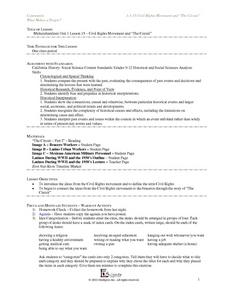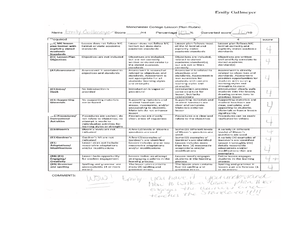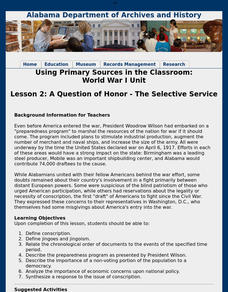Curated OER
"The Circuit" and the Civil Rights Movement
Young scholars compare and contrast concepts of the civil rights movement to the concepts presented in the short story, "The Circuit." In groups, they sort a series of ideas written on index cards into two categories - rights and...
Curated OER
How are Boundaries Created?
High schoolers examine two new concepts: orientalism and objectification. They view two film clips/videos on Seven Years in Tibet with Brad Pitt to incorporate the new concepts. In addition, students read Orientalism and write key...
Curated OER
Scientific Approach to Forest Management
Young scholars use wireless laptop computers to collect, store, communicate, and organize data from the 1999 Jasper Fire area. They collect data in the field and compare it to student-collected data from prior years to develop...
Curated OER
Lesson 1
Learners understand the meaning of natural resources. They distinguish between renewable and non-renewable natural resources. To help students identify natural resources as either non-renewable or renewable. To stimulate student thinking...
Curated OER
What Structural Challenges Do Bridge Builders Face Today?
Young scholars investigate the process of constructing a bridge. They study the meaning of structural force and draw pictures of examples. Students identify the types of building materials have been used in history to construct bridges...
Curated OER
What is Money? Learn the Role of Money in a Free Market System
Middle schoolers view a seashell and listen as the teacher explains that these were sometimes used as money. They listen as the teacher lectures on medium of exchange, barter, and commodity. Students determine the number of chickens it...
Curated OER
Entrepreneur Profit Balloon Game with Physical Education
Fourth graders explore business by participating in physical activities. In this entrepreneur lesson, 4th graders define profit and how it is necessary to run a successful business. Students pop balloons with monetary values inside and...
Curated OER
Extracting Meaning From What We See
Students recognize that all cultures have the same needs that they try to satisfy in ways that their predecessors found effective in their particular environments. Students discover how and why cultures change their customs.
Curated OER
Stay in School
Tenth graders explore the consequences of not taking responsibility for their own development.
Curated OER
Passport to the Eastern Hemisphere
Seventh graders create a time line of significant dates in the history of their nation. This requires students to examine the entire history of a country and make informed judgments based on their historical knowledge.
Curated OER
Marconi: Whisper in the Air
Young scholars explore Guglielmo Marconi, the genius who invented the wireless and helped change our planet into a global village.
Curated OER
Time Machine: Drive for the American Dream
Students view a documentary on automobiles. Americans have always been in love with automobiles. They are a definition of character, and a representation of social status. After viewing, students discuss what they saw and create an...
Curated OER
Coin Content
Students calculate ancient Greek coin values as compared to their weight, and equivalence in grain. They then determine their worth today. They convert metric to U.S. customary weight systems.
Curated OER
Power
Students analyze people's sources of power: resources, organization and numbers. They determine when and how power is exercised by analyzing specific examples.
Curated OER
How Did This Happen?
Students use websites and discussion to investigate the 2004 Asian Tsunami. Students identify the Indian Ocean coastline's physical, political and human geography features and consider how they affected loss of life and property in those...
Curated OER
Regions: Meet the Experts Presentation
Young scholars gather information and create a web site on prairies and plains using a variety of resources, including the internet.
Curated OER
A Question of Honor - The Selective Service
Eleventh graders define conscription, jingoes and jingoism. They relate the chronological order of documents to the events of the specified time period, then describe the preparedness program as presented by President Wilson.
Curated OER
Costs & Benefits
Students reinforce the concept of the true costs being what is given up by doing something -- normally referred to as opportunity costs.
Curated OER
Investigating the Technological Impacts on N.C.
Fourth graders search the internet to identify ways in which technology has influenced the lives of North Carolinians.
Curated OER
Lesson Plan 2--3000 B.C. to 2000 A.D.?
Young scholars, in groups, study the different writing systems from 3000 B.C. to 2000 A.D.
Curated OER
Declaration of Independence
Students research the Declaration of Independence and write a group paper. Students use a set of designated questions as a guide for the threee to four page paper.
Curated OER
Presenting... the Prime Ministers of Canada
Students access the First Among Equals website and research Canadian Prime Ministers.
Curated OER
The People of Kansas: Where did they come from and why did they come?
Students develop and understanding of emigration and the reasons for emigration. They use census data to study the migration of people to Kansas.
Curated OER
Comparing Primary Sources from the Industrial Revolution
Tenth graders, in teams, analyze, evaluate and describe primary sources pertaining to industrialization at the turn of the century. They examine the sources and answer questions about each.
Other popular searches
- Economic Terms and Definitions
- Basic Economic Terms
- Bic Economic Terms
- Baic Economic Terms
- Ari Economic Terms
- Agri Economic Terms
- Economic Terms Word Search
- Economic Terms Wordsearch

























